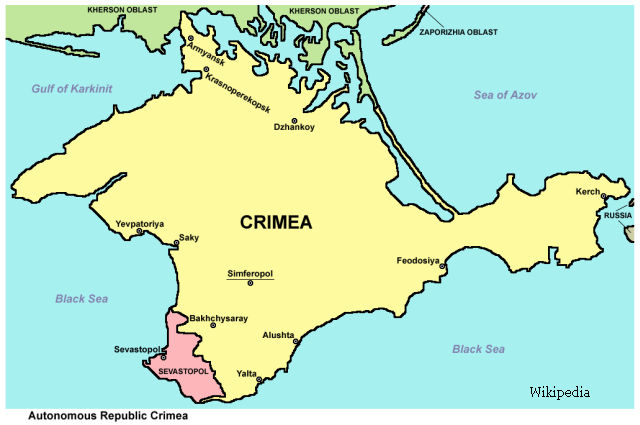Crimea: What Comes Next?
A look at the geopolitical situation after the annexation of Crimea to the Russian Federation

Corina Cristea, 04.04.2014, 13:54
Russia’s annexation of the Crimean peninsula stands out as an equally efficient and cynical military undertaking. Political pundits even said it was a masterpiece in its own right. The whole operation lasted less than three weeks and unfolded with no bloodshed, well, almost. Russia tried to legitimate its military invasion with a large number of apparently sensible arguments. The historical timeline for the peninsula reveals that Crimea was part of Russia until 1954, when the then Soviet leader, the Ukrainian Nikita Khrushchev, transferred Crimea under the rule of Kiev.
The peninsula’s demographic chart shows that neither the Ukrainians nor the Tatars make the region’s largest community, but the ethnic Russians, who, for their most part, are Russian passport holders. As a democratic exercise, in the recently-held referendum, the Russians’ overwhelming majority voted for Crimea returning to Russia, so Moscow is lawfully committed to protecting its citizens from the threat posed by Ukrainian nationalism. Besides, from the perspective of international law, there is the precedent of Kosovo, a Serb province that broke away with Belgrade, supported by Western powers, becoming an independent state.
Unlike the developments in Crimea, Rusia’s interventions in other former Soviet states were far more brutal and hesitant. It took months of armed conflict and several hundred of people killed for the region of Transdniestr to de facto separate from the Republic of Moldova in 1992, after the intervention of Russian troops. We shouldn’t also forget that in 2008 when the former Red Army’s tanks were just at the outskirts of the Georgian capital Tbiilisi, Abkhazia and South Ossetia were forcefully cut off from Georgia’s territory.
Political analysts and Western governments have voiced their concern that for the Kremlin leader Vladimir Putin, the Crimean episode only whet his appetite, so much so that in the short run Moscow looks set to claim new territories. Putin himself stated that, for the Russian army, “the events in Crimea were an exam”. NATO’ s Secretary General Anders Fogh Rasmussen admitted he feared Russia’s future targets could be Russian-speaking and pro-Russian territories east of Ukraine. Romania’s President Traian Basescu himself shared in the view commonly adopted by the entire European and Euro-Atlantic community on the recent developments in Crimea.
”We just cannot afford looking at the incidents in 2008, when the Russian Federation seized Abkhazia and South Ossetia, as if they were some isolated incidents. Ukraine followed, and any politician, just like any military strategist, should wonder what or who comes next. Whether it is Transdniestr or the Republic of Moldova, these are questions anyone can ask. The Russian Federation’s unpredictability is prompting us to take more than one course of action into account, as well as several possible responses.“
In turn, Moldovan Prime Minister Iurie Leanca reiterated his concerns over possible repercussions on the Republic of Moldova, following the precedent set in Ukraine. He warned that the breakaway regime in Transdniester could cause similar situations through unilateral decisions. Military analyst Cornel Codita, a retired general of the Romanian Army, does not see many similarities between Ukraine and the Republic of Moldova.
“These are 2 states with different political backgrounds and with very contrasting historical and judicial realities. Obviously many people thought that the developments in Crimea could be followed by similar ones in Transdniester. I believe that Russia’s move has created too many problems as it is, and in this context it’s rather unlikely for similar episodes to reoccur in the long run. On the other hand, Ukraine is a strategic objective for Russia, while Transdniester and the Republic of Moldova are nothing but auxiliary elements in a policy that Russia is set to apply.”
Could Moldova be protected from Russia once it joins the EU and NATO? The Association and Free Trade Agreements with the EU were initialed last autumn and could be signed any time soon. But the Republic of Moldova’s membership in a military alliance is ruled out by the country’s Constitution. However, after the Crimean crisis, some people said such restrictions are a thing of the past.
“The EU has reacted by speeding up the association process. As to Moldova’s NATO accession, this is an issue for the Moldovan officials to debate and analyze, and only after they have made a clear-cut decision on the matter, we could argue whether their move is credible or not, whether the process of NATO integration can be accomplished rapidly, slowly or not at all”.
However, experts with the Early Warning analysis center in Bucharest say that, for the time being, Putin’s greatest challenge is Crimea, as seen from the perspective of the financial effects entailed by its annexation. The costs of the invasion per se could reach 9 billion dollars. The pensions and salaries of the public servants from Crimea, now employees of the Russian Federation, exceed 15 billion dollars, in the context in which the annual expenses of the Russian federal government amount to almost 400 billion dollars. Putin has shown that prestige prevails over costs and that he is ready to take the risk on behalf of grandeur, the Early Warning center also says. For the time being, Russians hail the decision of their leaders regarding Crimea, but the inflation that might occur sooner or later is likely to drastically change their attitude. Consequently, analysts say, the bill for






























